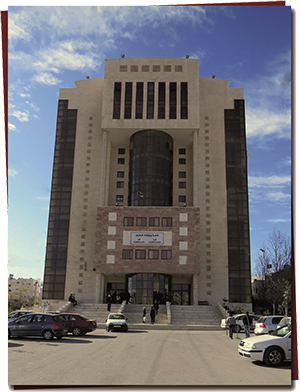
In 1990, the first bachelor's program in the Faculty of Engineering in automotive engineering, a branch of mechanical engineering, was launched, followed by a bachelor's program in computer systems engineering.
A few years later, other majors were introduced, in response to a clear philosophy planned by the Faculty of Engineering based on the principle of specialization and the combination of theoretical approaches and practical methods. On the other hand, the college has presented other majors to meet the requirements of the labor market and to supply it with specialists in advanced engineering sciences. Therefore, considerable progress has been made on designing pioneering study programs at the level of engineering education in our region. The Faculty awards a five-year bachelor’s degree in the fields of: Industrial Automation Engineering, Medical Device Engineering, Electronics and Communications Engineering, Electrical Power Engineering Technology, Smart Systems and Devices Engineering, Automotive engineering, Mechatronics Engineering, Air conditioning Engineering, Renewable Energy Engineering, Building Engineering, Surveying and Geomatics Engineering, Environmental Technology Engineering, Civil Engineering, Infrastructure and Architecture, Interior Architecture and Decoration.
The excellence and competence of graduates of the Faculty of Engineering at Palestine Polytechnic University have a high recognition in the field, and this has been highlighted by their active and creative role in various fields and positions they have occupied. Their high level was a reason for the pride and appreciation of their Faculty of Engineering. The Faculty was intended to obtain a leading position in the engineering education system in Palestine, as it offers the opportunity to study for more than two thousand and five hundred male and female students divided into four academic departments with various specialties.
The policy of the Faculty of Engineering is based on flexibility and dynamism regarding to the study plans for its various specializations. Courses are developed to keep pace with the recent developments in the realm of engineering, while outlining the needs of the market and the local community, without violating the international standards for awarding engineering degrees.
The Faculty of Engineering follows two approaches:
1. Theoretical approach is the first one. It highlights the aspects of research, design and analysis, and lays a solid foundation for graduate studies. This approach has distinguished the graduates of the faculty in their postgraduate studies in various Arab and international universities.
2. Practical approach is the second one. It concerns with the aspects of performance, supervision, maintenance and management, which paves the road for the graduates to be involved in the practical life.
The Faculty of Engineering has developed a comprehensive range of modern laboratories supervised by expert engineers and skillful technicians. A special attention has also given to other requirements like communication skills and the skills of using the technology of information in different areas.
Vision and Mission
Vision: our vision was to achieve excellence in engineering education and scientific research in order to enhance the service of the community and the development of the national and international economy.
Mission: our mission was to prepare qualified engineers in the scientific, technological, research and ethical aspects to meet the requirements and needs of the national and international labor market, and to employ knowledge to serve society and humanity and achieve a comprehensive and sustainable national progress.
Goals and Objectives
The Faculty of Engineering aims to:
- Have an effective participation in the development of the concept of engineering education so as to keep pace with the recent development at the global level.
- Provide modern and high-quality study programs that meet the requirements of national and international institutions.
- Provide a proper environment to achieve a high-level and thought-enriching study, which makes graduates more considerate and responsive to the market needs and to the community requirements.
- Introduce students to the mechanisms and techniques of self-education, self-development, training and continuous learning by mastering a wide range of imparted skills.
- Enable students to participate in systematic research that allows them to gain research experiences with the help and supervision of professors from the faculty.
- Play a main role of excellence in the skills, resources and engineering expertise required to enhance the national industry, which includes providing professional training in the field.
- Enhance the role of scientific research and development in achieving comprehensive sustainable national progress.
- Enhance interpersonal and intrapersonal skills of the graduates.
- Consolidate the relationship with the local institutions of Palestinian community and boost networking with engineering sectors.
